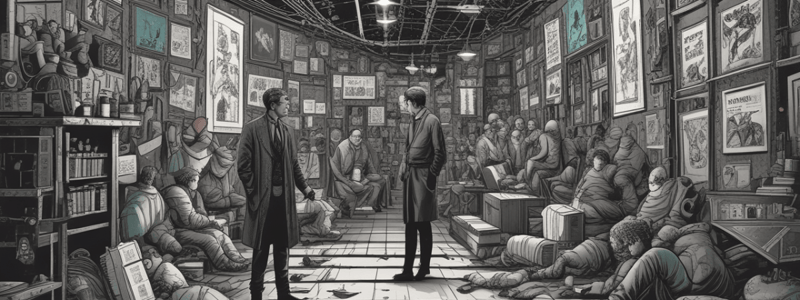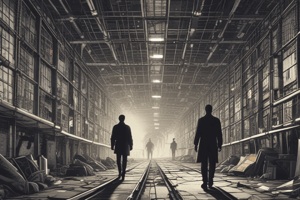Podcast
Questions and Answers
Which theory suggests that criminal behavior is a coping mechanism to deal with negative emotions?
Which theory suggests that criminal behavior is a coping mechanism to deal with negative emotions?
- Social Disorganization Perspective
- Robert Agnew's General Strain theory (correct)
- Robert K. Merton's Anomie theory
- Edwin H. Sutherland's Differential Association theory
Which theory suggests that deviance and crime are a coping mechanism to deal with negative emotions?
Which theory suggests that deviance and crime are a coping mechanism to deal with negative emotions?
- Structural Theories
- Social Disorganization Perspective
- Robert Agnew's General Strain theory (correct)
- Edwin H. Sutherland's Differential Association theory
Which theory explains how violence is accepted to stand up against someone who is disrespectful?
Which theory explains how violence is accepted to stand up against someone who is disrespectful?
- Elijah Anderson's Code of the Street (correct)
- Robert K. Merton's Anomie theory
- Stephen F. Messner & Richard Rosenfeld's Institutional Anomie theory
- Albert K. Cohen's Theory of blocked opportunity/gang formation
Which theory explains how violence is accepted to stand up against someone who is disrespectful?
Which theory explains how violence is accepted to stand up against someone who is disrespectful?
Which theory suggests that behavior depends on our definition of the situation, which is developed through interactions within intimate groups?
Which theory suggests that behavior depends on our definition of the situation, which is developed through interactions within intimate groups?
Which theory emphasizes material success and the unequal opportunity to achieve it?
Which theory emphasizes material success and the unequal opportunity to achieve it?
Which theory suggests that behavior depends on our definition of the situation, which is developed through interactions within intimate groups?
Which theory suggests that behavior depends on our definition of the situation, which is developed through interactions within intimate groups?
Which theory explains the norms and values of delinquent subcultures?
Which theory explains the norms and values of delinquent subcultures?
Which theory suggests that not all lower class individuals turn into delinquent subcultures?
Which theory suggests that not all lower class individuals turn into delinquent subcultures?
Which theory focuses on institutional power imbalance in society?
Which theory focuses on institutional power imbalance in society?
Which theory explains the norms and values of delinquent subcultures?
Which theory explains the norms and values of delinquent subcultures?
Which theory focuses on institutional power imbalance in society?
Which theory focuses on institutional power imbalance in society?
Which theory suggests that not all lower class individuals turn into delinquent subcultures?
Which theory suggests that not all lower class individuals turn into delinquent subcultures?
Which theory explains high crime rates in areas with poor economy, residential instability, and ethnic heterogeneity?
Which theory explains high crime rates in areas with poor economy, residential instability, and ethnic heterogeneity?
Which theory suggests that criminal behavior is learned through observation of punishments and rewards associated with behaviors?
Which theory suggests that criminal behavior is learned through observation of punishments and rewards associated with behaviors?
Which theory explains high crime rates in areas with poor economy, residential instability, and ethnic heterogeneity?
Which theory explains high crime rates in areas with poor economy, residential instability, and ethnic heterogeneity?
Which theory focuses on how economic conditions affect crime?
Which theory focuses on how economic conditions affect crime?
Flashcards are hidden until you start studying
Study Notes
- Strain/Anomie Theories focus on how economic conditions affect crime.
- Robert K. Merton's Anomie theory emphasizes material success and the unequal opportunity to achieve it.
- Robert Agnew's General Strain theory considers deviance and crime as a coping mechanism to deal with negative emotions.
- Stephen F. Messner & Richard Rosenfeld's Institutional Anomie theory focuses on institutional power imbalance in society.
- Social Disorganization Perspective explains high crime rates in areas with poor economy, residential instability, and ethnic heterogeneity.
- Learning Theories suggest that criminal behavior is learned through observation of punishments and rewards associated with behaviors.
- Edwin H. Sutherland's Differential Association theory suggests that behavior depends on our definition of the situation, which is developed through interactions within intimate groups.
- Structural Theories explain the norms and values of delinquent subcultures.
- Albert K. Cohen's Theory of blocked opportunity/gang formation suggests that not all lower class individuals turn into delinquent subcultures.
- Elijah Anderson's Code of the Street explains how violence is accepted to stand up against someone who is disrespectful.
Studying That Suits You
Use AI to generate personalized quizzes and flashcards to suit your learning preferences.




